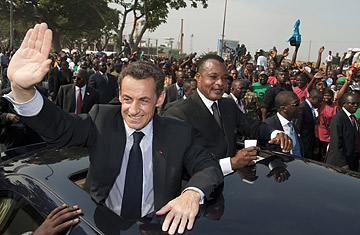
French President Nicolas Sarkozy and Republic of Congo President Denis Sassou Nguesso are cheered by supporters as they arrive at Maya-Maya airport in Brazzaville, Republic of Congo.
French leaders have always been more frequent visitors to Africa than their Western peers, but President Nicolas Sarkozy looks set to eclipse them all in trips to the continent. On Thursday, Sarkozy began his fifth African sojourn in less than three years with a trip to the Democratic Republic of Congo (DRC), a violence-plagued Central African nation that of which most Western officials steer well clear. His goal? To sell his ambitious plan economic cooperation aimed at bring peace to some of the region's embattled countries — and in the process restore French influence in Africa.
Given the mix of altruistic and self-serving motives, it's not surprising Sarkozy's trip is inspiring as equal measures of hope and suspicion. The French president kicked off his three-nation swing through the Great Lakes region in Kinshasa, where he praised President Joseph Kabila for reaching agreement in January with leaders of neighboring Rwanda to launch joint military operations against militia groups fighting both regimes from strongholds in eastern Congo. The result, Sarkozy noted, has been an a halt to the massacres that have forced tens of thousands of civilians to flee the area. (See pictures of war and displacement in Congo.)
Sarkozy emphasized economic development and cooperation as the key to cementing the peace, reiterating an earlier proposal that the DRC, Rwanda, Uganda and Burundi pursue agreements to share resources and pursue joint development of their energy, transport and telecommunications infrastructure. The region's prospects for peace, Sarkozy said, would be greatly boosted by creating a "single market" similar to that of the European Union.
"Structured cooperation brings the certainty that everyone will benefit," Sarkozy said in a speech to the DRC's parliament. "Why not provide more momentum to something already advancing? Why not go even further?"
One reason that regional powers might be leery of going even further would be the past decade and a half of vicious cross-border proxy warfare and direct intervention that eventually became what many dubbed Africa's First World War. Regional power plays had a role in the 1994 Rwandan genocide that killed 800,000 Tutsis and moderate Hutus — an outrage that the current Rwandan government accuses France of helping to enable. And the fallout from the Rwandan genocide has continued to plague Eastern Congo, where it has produced periodic massacres in the intervening years. Deep-seated hostilities across the region's fragile borders have prompted many in Congo to denounce the January agreement which allows Rwandan troops to operate inside the DRC, accusing Kabila of joining arms with the Rwandan enemy and openly challenging his legitimacy to rule. Sarkozy intended his praise of Kabila as a means of boosting the embattled DRC president, and the same time as promoting his proposal for new economic and industrial partnerships in the region. (Read a TIME cover story on Rwanda.)
The economic integration being advocated by Sarkozy is not exactly selfless, however; it's entirely compatible with advancing France's economic interests and its waning political influence across the continent. The DRC, which is the size of Western Europe and is the world's largest French-speaking nation, is also fantastically rich in resources, and could logically be expected to partner with France when restored stability allows economic and industrial development to begin in earnest. Exchanges between the two countries now stand at a modest $250 million per year; but that might be boosted as a result of a trip on which Sarkozy was accompanied by officials from construction firms Lafarge and Vinci, France Telecom, Aeroports de Paris, and Alstom.
There may be a second political purpose served by Sarkozy's proposal for the sharing of resources between nations whose size and natural riches vary drastically: wooing Rwandan leaders hostile to Paris. Most of Rwanda's Tutsi-dominated government still blame French conniving with — or outright support of — the Hutu militias that conducted the 1994 genocide. In 2006, Rwanda formally broke off ties with France; Sarkozy has made restoring the relationship a foreign policy priority. (See pictures of Sarkozy in the U.K.)
The rupture came after French legal investigators indicted nine members of Rwanda's government — and implicated President Paul Kagame — for alleged complicity in the political assassinations that proceeded the Hutu genocide of Rwandan Tutsis. The indictments also charge those officials with acts aimed at amplifying the slaughter of their fellow Tutsis. Rwanda rejects those charges as seeking to cover what they describe as France's involvement in aiding, arming, and assisting the Hutu genocide effort, insisting Paris wants to cleanse its own guilt by casting Tutsi rebels who halted the massacre as the culprits behind it. Critics in the DRC see Sarkozy's resource-sharing idea as a French plan to get back into Rwandan good graces at Congo's expense. (See more pictures of Congo.)
Sarkozy also plans to visit Brazzaville, capital of the neighboring Republic of Congo, and Niger, in search of business opportunities for French companies. French commentators have noted how such business-as-usual tightness with African cronies, whose track record on democracy and human rights often leaves much to be desired, contrasts with Sarkozy's earlier pledges to break with Paris' traditional Françafrique policy of turning a blind eye to authoritarianism and corruption to maintain healthy relations with stable African allies. (See pictures of the Pope's recent visit to Africa.)
"We don't have the vocation of falling out with those who have been our friends historically, and who have done us great favors," explained Claude Guéant, Sarkozy's chief of staff, to Le Monde ahead of the Central Africa visit. "To count, France must speak to everyone, and she can do that more than other nations can."
